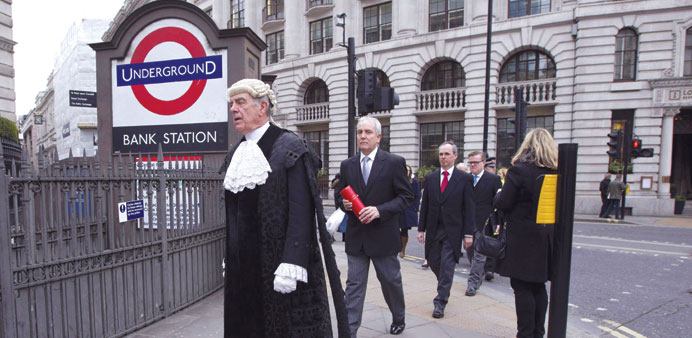Reuters/London
Campaigning in Britain’s closest election in decades began yesterday after Prime Minister David Cameron met Queen Elizabeth to tell her parliament had been dissolved, teeing up a fraught battle to govern a $2.8tn economy.
Cameron made the journey to Buckingham Palace to see the monarch in an armoured limousine as TV crews buzzed overhead, a formality marking the end of five years of coalition government between his Conservatives and the centre-left Liberal Democrats.
Britain excels at set-piece constitutional events. The consequences of the May 7 election - which polls predict nobody will win with an outright majority - look more disorderly.
Membership of the EU could hang on the outcome as does the future of the increasingly frayed relationship between the UK and its most restive part: Scotland.
Standing in front of his Downing Street office after meeting the Queen, Cameron told voters he had presided over an economic recovery that needed cementing.
“In 38 days you face a stark choice,” he said. “The next prime minister walking through that door will be me or (Labour leader) Ed Miliband. You can choose an economy that grows ... or you can choose the economic chaos of Ed Miliband.”
Miliband, speaking at an event meant to dispel criticism his party is anti-business, said Labour offered a fairer economic plan and warned Cameron’s plan to hold an EU membership referendum posed a “clear and present” danger.
“It is a recipe for two years of uncertainty in which inward investment will drain away,” he said.
In a sign of how fragmented Britain’s political landscape has become, Cameron and Miliband will join the leaders of five other parties on Thursday for a seven-way TV debate.
Both the Conservatives and Labour say they want to better manage immigration and pump more money into the state health service. The main difference between them is on a still-yawning budget deficit. The Conservatives promise to cut it faster, Labour says it would do so more slowly. Latest opinion polls underscored the electoral uncertainty. One gave Labour a four point lead, the other put the Conservatives ahead by the same margin.
Most polls put the two neck-and-neck. None gives either party enough support to govern alone. That means the winner may need to rule in minority, relying on others on an issue-by-issue basis, or enter a formal coalition with another party.
The contest is freighted with contradictions. Even though the economy has rebounded from its deepest downturn since World War II to become one of the fastest-growing in the industrialised world, many Britons haven’t felt the benefit as wages have stagnated. If Cameron is re-elected, he has promised to deliver an EU membership referendum by the end of 2017, raising the spectre of Britain leaving the world’s largest trading bloc, something the US and much of UK business has made clear it doesn’t want.
If Britain voted to leave the EU, Scottish nationalists have signalled they would push for another independence referendum, even though they lost one just last year. Labour opposes an EU referendum.

Colonel Geoffrey Godbold (left), the Common Cryer and Serjeant-at-Arms for the city of London, walks to the steps of the Royal Exchange Bank in centra
